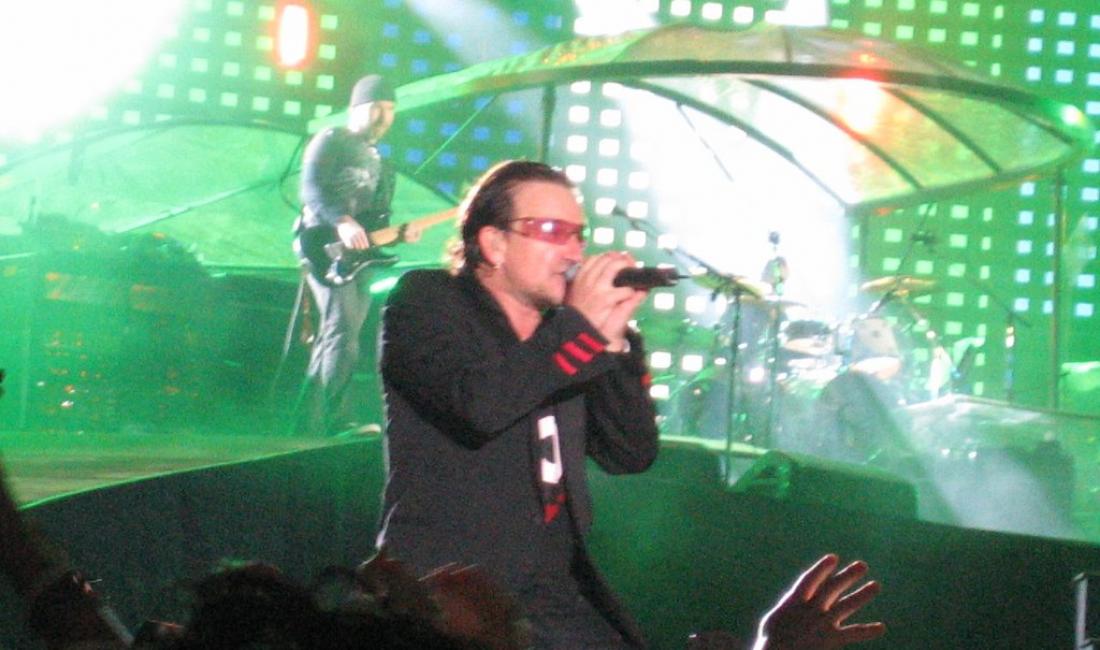An elected Dublin mayor could change world
Photo credit: hugefluffy, Dublin Croke Park 24th June via Flickr CC BY-NC-ND 2.0 Deed. The Democracy Column is co-published with Zócalo Public Square.
“Better pass boldly into that other world, in the full glory of some passion, than fade and wither dismally with age.” —James Joyce, “The Dead,” Dubliners
Dear Bono,
Now that U2’s residency at the Sphere in Vegas is successfully concluded, it’s time for you to get really creative—by returning home to Dublin to prepare to run for mayor.
I know, I know—Dubliners don’t actually elect their mayors, so you can’t run. At least not yet. Which is precisely why they need you there.
You’re the best candidate to bring real local democracy to your home island, famous for its fierce nationalism. If you championed local democracy there, the world might well take notice—and build the strong local governments that humanity will need to survive.
You know as well as anyone, from your globe-trotting to fight poverty and HIV/AIDS in the Global South , that the world’s national governments aren’t up to protecting us from our planetary problems—climate catastrophe, pandemic, war, poverty, economic crises. Nationals governments are too busy making things worse. Meanwhile, our international institutions remain too weak and fractious to accomplish much of anything.
That has dumped all the world’s problems in the laps of local communities and their governments. But they lack the authority and resources to tackle big challenges.
Ireland, sadly, is a poster child for poor local government . While many people think of the Emerald Isle as a place of charming well-governed communities, the reality is that your home country is governed almost entirely from the center. On the Local Autonomy Index, Ireland ranks at the bottom of Europe, ahead of only authoritarian Hungary, Putin’s Russia, and Moldova, which is partially occupied by Russia. A Council of Europe report on Irish governance found that your national authorities determine all kinds of fundamentally local decisions—down to the location of bus stops.
To borrow from your best songs, in those Irish municipalities where the streets have no name, or where residents might want to tear down the walls that hold them inside, a local government can’t do much without asking the national government’s permission.
Dublin, as a result, has perhaps the weakest government of the world’s great cities. Like other Irish municipalities, the city does elect councilors, but they can’t do much. The city can’t hire staff without the national government’s support (which is why Helsinki, a European capital of similar size, has 38,000 staffers compared to Dublin’s 6,000). Dublin also lacks the money and authority to handle governmental basics like road planning, building adequate flood defenses, or even enforcing laws on illegal parking and “dog fouling.”
The good news is that cracks are opening in this wall of centralized power. During the pandemic, Dublin managed to convene a citizens assembly—made up a representative group of Dubliners selected by lottery—that recommended structural changes to strengthen the city government. Their recommendations included establishing a full-time city council and a directly elected mayor who could serve up to two five-year terms.
Under the plan, Dublin’s government would gain control immediately over 15 policy areas—including housing, homelessness, transportation, the environment, and emergency response—and add further local authority over policing, water, and education in the next decade. Crucially, the assembly proposed giving the mayor’s office the power to borrow and to levy local taxes.
Advocates say that such a mayor would need a strong personality that could unify Dubliners, and have such a compelling voice that the national government would have to listen to demands for local autonomy.
You’ve got a pretty good voice—Billie Joe Armstrong described your singing as “50 percent Guinness, 10 percent cigarettes, and the rest is religion”—which is why you’d be the best choice.
Unsurprisingly, the national government has blocked the citizens assembly’s proposals. But the fight is not over. It’s just moved southwest to Limerick, population 102,000.
Limerick, via a local referendum, managed to secure permission for a pilot program to elect its mayor directly. The election is June 7, the same day the Irish vote for councilors in all 31 local authorities, and for their representatives in the European Parliament.
The Limerick mayor’s race has been a closely watched campaign, with 13 candidates representing every color in the political spectrum, and every significant party. The power of Limerick’s mayor won’t come anywhere close to what the citizens assembly proposed for Dublin, but candidates are promising to advocate for greater local control over housing, health care, and various quality-of-life issues.
If you returned to Dublin, you could lead a campaign to adopt the citizens assembly recommendations. For leverage, you could push a local referendum for a mayoral pilot like Limerick’s. If you won, it’d be hard to see how the national government could withstand your calls for more local authority.
Remember, if you succeed, you won’t just get to be mayor. You’ll get to build a new city government. You could draw experts and ideas from every corner of the globe. You could give the earth a model for 21st century local governance.
You’d also be the perfect person to bring together local governments around the world—and the still relatively weak networks of cities that now exist—into planetary institutions that could solve those big problems.
Yes, it would mean a change in lifestyle. But locals in Killiney, your seaside community south of Dublin, say you were home quite a bit during the pandemic. And yes, as mayor you couldn’t tour as much as you do now, but at 63, it’s time for more rest anyway. You wouldn’t have to break up the band. The Edge would make an aggressive housing director.
Sure, you’ll face criticism and have bad days as mayor. But as Joyce wrote in Ulysses, “A man of genius makes no mistakes. His errors are volitional and are the portals of discovery.”
Come home and run. You might finally find what you’re looking for.
Joe Mathews




